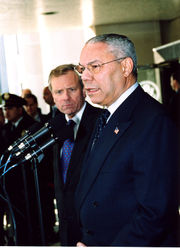|
What is leadership?
Leadership is
the ability to influence, inspire or motivate others to reach a desired goal or outcome (Dubrin, Daglish & Miller, 2006;
Samson & Daft, 2003).
Successful leaders
have a clear vision or goal of what is to be achieved, and are able to communicate that vision to others in order to motivate
them. (McFayden, 2006). By creating the desire among others to reach the goal, the leader is then able to describe ways to
make the vision a reality, and manage people accordingly, to make changes (Dubrin et al, 2006).
Is there a difference between leadership and management?
It is important
to realise that there is a difference between leadership and management. Leadership; is about motivation, inspiration and
influence, and in many cases it can be viewed as more emotional and challenging than simply managing a group of people. Managing;
is about organisation, planning, control and authority. Leadership takes the management process one step further and requires
a stronger emotional connection between the two parties (the leader and the group) (Dubrin et al, 2006) Successful leaders
have a vision (a clear picture of what they want to achieve), and are able to motivate and inspire people to make that vision
achievable. Therefore, managers are more likely to ‘maintain’ an environment, where as good leader are able to
‘change’ an environment if necessary (Dubrin et al, 2006). However, good leaders must also have good management
skills in order to succeed. You can have all the ideas and visions in the world, but if you cannot manage people accordingly
to make them achievable, through management techniques (such as direction, supervision and monitoring) chances are that you
may not be as successful. (Samson & Daft, 2003) As clearly stated by Clutterbuck & Hirst (2002, p. 2) “The reality
is that management and leadership are inextricably linked. A truly excellent leader requires good management skills, and the
best managers are also leaders to some extent.”
The following diagram offers a summary of the main differences between leadership and management.
|
|
| (Samson & Daft, 2003, .p.351) |
“Leadership is the art of achieving more than the science of management says is possible” Colin
Powel, retired US general and Chief of staff
(Cole, 2001, p.625)

|
| Colin Powell |
Journal Articles that may be of interest:
“Emotional
Intelligence and Effective Leadership” - Benjamin Palmer, Melissa Walls, Zena Burgess, Con Stough
http://0-www.emeraldinsight.com.library.ecu.edu.au:80/10.1108/01437730110380174
The Impacts of a successful leader…
One of the dominant
traits of a successful leader is that they are able to facilitate or initiate change, and inspire people to achieve things
they never dreamt to be possible (Dubrin et al, 2006). There are countless examples throughout history that highlight the
impact that a successful leader can have on the lives of everyday people, through determination and perseverance.
For example
consider Martin Luther King, a truly amazing leader who fought for what he and many others had only dreamt about – a
world were there was no racial prejudice or discrimination, with equal rights for black and white people. His efforts and
achievements will always be remembered, for the positive changes he was able to create, due to his tremendous courage and
leadership skills
(White, 2003).

|
| Martin Luther King |
Leaders can
sometimes become so powerful and influential that they can initiate changes and actions that are not always positive. They
have the capability to become so dominant and persuasive, that followers become submissive and will do anything that they
are told because they have so much faith in the leader (Dubrin et al, 2006). For example consider Adolph Hitler, who was able
to convince (some say ‘brainwash’) his followers through speeches and use of status and power to commit some of
the most awful and barbaric acts humanly possible. He became so powerful, that he literally controlled wether many people
lived or died. (http://www.spartacus.schoolnet.co.uk/GERhitler.htm, 2007)
To view more information on Hitler please view the following website: http://www.spartacus.schoolnet.co.uk/GERhitler.htm
Leadership Roles
Academics
have classified nine main roles that are part of leadership:
- “Figure Head” – a real life representation of an organisation
or group of people
- “Spokesperson”- answering inquires of speaking / acting on
behalf of a group to keep others informed of events or activities
- “Negotiator”- bargaining
and dealing with others to reach compromise or consensus
- “Coach”- to encourage and recognise other team members efforts,
contributions and achievements
- “Team Builder”- to build morale and cohesion
- “Team Player” – co-operation and commitment to the group
- “Technical Problem Solver”- “serving as a technical expert
or advisor”
- “Entrepreneur”- encouraging and initiation innovation and ‘out
of the square’ thinking
- “Strategic planner”- to implement strategic leadership strategy’s
(Dubrin
et al, 2006, p. 12)
All
these roles combined, are necessary to become a great leader.
|